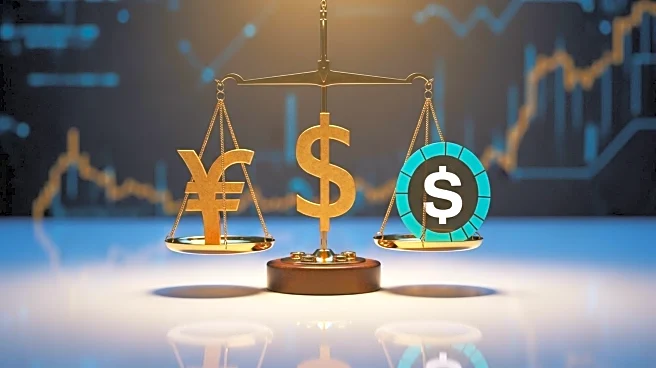What's Happening?
Ray Dalio, founder of Bridgewater Associates, has raised concerns about the weakening status of the U.S. Dollar as a reserve currency. In a recent interview, Dalio linked this trend to the increasing adoption of Bitcoin, other cryptocurrencies, and gold as alternative stores of value. He highlighted the appeal of digital assets due to their limited supply, which positions them as attractive alternatives to fiat currencies when demand for the dollar declines. Dalio also warned about the risks associated with unsustainable borrowing and rising U.S. debt, which he believes could lead to a 'debt-induced heart attack' within two to three years. The U.S. debt burden currently stands at $37.3 trillion, with interest expenses reaching $60.95 billion in July. Dalio emphasized that as confidence in the U.S. Dollar wanes, investors are shifting toward assets like gold and cryptocurrencies. Additionally, he addressed the role of stablecoins, arguing that they could be safe if well-regulated but warned of risks tied to the declining purchasing power of U.S. Treasuries.
Why It's Important?
Dalio's warnings highlight significant concerns for the U.S. economy and financial markets. The potential decline of the U.S. Dollar as a reserve currency could have profound implications for global trade and investment, affecting the dollar's role in international transactions. The shift towards alternative assets like Bitcoin and gold reflects growing investor sentiment that seeks hedges against inflation and currency devaluation. This trend could accelerate if structural imbalances in the U.S. economy persist. Furthermore, Dalio's caution regarding stablecoins underscores the need for robust regulatory frameworks to prevent potential financial instability. The risks associated with U.S. debt and the possibility of political interference in monetary policy could undermine confidence in dollar-denominated assets, impacting both domestic and international stakeholders.
What's Next?
The ongoing shift in investor sentiment towards alternative assets suggests a potential reevaluation of traditional financial instruments. As concerns over U.S. debt and monetary policy persist, stakeholders may increasingly seek diversification in their portfolios. The Federal Reserve's independence remains a critical factor, with potential political influences posing risks to its credibility. If the Fed's independence is compromised, it could further erode confidence in the U.S. Dollar, prompting more investors to explore digital currencies and precious metals. Regulatory developments concerning stablecoins will be closely watched, as they could shape the future landscape of digital finance.
Beyond the Headlines
Dalio's analysis points to a structural shift in global finance, where the declining dominance of the U.S. Dollar is accelerating the adoption of alternative stores of value. This shift could lead to long-term changes in how investors approach risk management and asset allocation. The ethical and legal dimensions of stablecoin regulation will be crucial in ensuring market stability and protecting investors. Additionally, the cultural implications of a potential decline in the U.S. Dollar's status may influence geopolitical dynamics and international economic relations.










